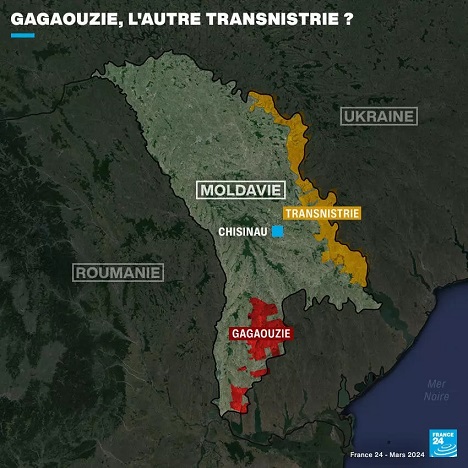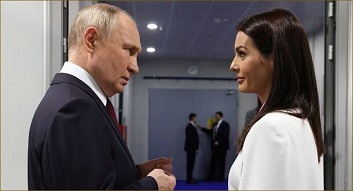Gagauzia, the other pro-Russian thorn in Moldova’s side
Sébastian SEIBT
Highlights: Moldova is seen as a target of Russian destabilization operations. Moscow especially has its sights set on a part of Moldovan territory, Transnistria. But it is Gagauzia that has attracted more media attention in recent days. The Russian decision to exploit the situation is not surprising, according to experts in Russia and Moldova. The former Soviet republic is wedged between Romania and Ukraine and does not benefit from NATO protection.. Among the 135,000 inhabitants of the region, most are Turkish- Orthodox Christians. Almost a third of the population holds Russian nationality.
Could Gagauzia become a second Transnistria? This is what one might think after the governor of this small region of Moldova received assurances from Moscow to support her...
As if the independence aspirations of Transnistria were not enough for Moldova's misfortunes. For more than a week, another region of this small landlocked country between Ukraine and Romania has added a pro-Russian thorn in Chisinau's side: Gagauzia.
Indeed, since February 2022 and the Russian offensive in Ukraine, the fate of Moldova has become a source of concern. This former Soviet republic, wedged between Romania and Ukraine (and which does not benefit from NATO protection) is seen as a target of Russian destabilization operations.
Moscow especially has its sights set on a part of Moldovan territory, Transnistria, which has escaped its sovereignty since the disintegration of the USSR in 1991. Since then, a Russian army corps has been stationed there. But it is Gagauzia that has attracted more media attention in recent days. Evgenia Gutul, the baskan (governor) of Gagauzia since July 2023, was very officially invited by Russian President Vladimir Putin to the World Youth Festival in Sochi, which ended on March 7.
The master of the Kremlin assured that Russia would “protect the interests” of the pro-Russian populations of this region in the very south of Moldova, against the “illegal actions” of the Moldovan government of Maia Sandu, argued Evgenia Gutul.
Gagauzia rather than Transnistria?—Sergei Kirienko, one of Vladimir Putin's main advisors, often presented as the mastermind of most Russian influence operations, also met with the governor of Gagauzia to “discuss the means available to Moscow to support [her]”, underlines experts from the Institute for the Study of War, an American think tank which publishes daily reports on Russia and the war in Ukraine.
“An abnormally high number of milbloggers [these Russian military commentators often from the ultranationalist movement very active on social networks, Editor's note] mentioned Evgenia Gutul's visit to Russia, indicating that the region is gaining in importance in the eyes of Moscow,” continues the report from the Institute for the study of war.
[RE: "The Institute for the Study of War": They are a group of primarily Jewish warmongers, the Kagan/Nuland family plus some shabbos goyim that are fomenting war & mayhem. They are no experts; this is no institute, and they produce no reports. They are criminals with an agenda to destroy Russia, plus Iraq, Syria, Libya, Afghanistan and Iran. – Editor, Another World Is Posible]
What should worry the very pro-EU Moldovan President Maia Sandu? Until now, the Kremlin seemed to be banking almost exclusively on the separatist region of Transnistria, on the border with Ukraine, to destabilize Moldova and try to reestablish a semblance of control over this former Soviet state which is leaning more and more towards the West.
The situation also seemed to become considerably tense at the end of February, with the “call for help” from the self-proclaimed authorities of Transnistria, who wanted Moscow to take “proactive measures” to protect them against Moldova. But Vladimir Putin had completely ignored this request for intervention. It therefore seems that the Kremlin prefers to go through the Gagauz window rather than the Transnistrian gate.
The Russian decision to exploit the situation in Gagauzia is not surprising for the experts interviewed by France 24. “It is with Transnistria, the most pro-Russian Moldovan region,” underlines Luke March, specialist in Russian relations. with Eastern countries at the University of Edinburgh. “There is fertile ground for Moscow because almost 95% of the population in Gagauzia is pro-Russian, including among the local elite.
And none of the candidates for Baskan last year supported Maia Sandu's [pro-EU] policy,” adds Ryhor Nizhnikau, a specialist in Russian-Moldovan relations at the Finnish Institute of International Affairs. However, Gagauzia cannot be reduced to another Transnistria.
Firstly, because among the nearly 135,000 inhabitants of Gagauzia, most are Turkish-speaking Orthodox Christians.
Nothing to do with Transnistria, where almost a third of the population holds Russian nationality, allowing Moscow to present itself as the defender of Russian speakers living beyond the borders of the motherland.
The shadow of the oligarch Ilan Shor—Furthermore, “if the conflict with the separatists in Transnistria has never been resolved, this is not the case in Gagauzia where an agreement concluded in 1994 stipulated a certain degree of autonomy for this region”, summarizes Adrian Rogstad, specialist in relations between Russia and Western Europe at the University of Groningen (Netherlands).
Since the 1990s, the elected governor of this region has, for example, been entitled to a position within the Moldovan government. Why then this outbreak of fever in the south of Moldova?
Since the start of the major Russian offensive in Ukraine, pro-Russian populations may have had the impression of being ostracized, recognizes Luke March. The Moldovan government notably banned around twenty Russian-speaking media outlets last October which were broadcast in the country and were particularly popular in Gagauzia “where nearly 90% of the population speaks Russian and gets their information mainly through Russian-speaking channels” , emphasizes Ryhor Nizhnikau.
Secondly, Evgenia Gutul is not just any pro-Russian politician. She belongs to the Șor party of Israeli-Moldovan oligarch Ilan Shor, “known for his good relations with Moscow”, notes Luke March. “He’s probably pulling the strings behind the scenes. He is someone who, since his exile in Israel, has been in open conflict with the Moldovan government and does not hesitate to push Russia's interests,” explains Adrian Rogstad.
Last year, he was accused by Moldovan authorities of fomenting a pro-Russian coup. He was also convicted in 2017 for embezzling nearly a billion dollars, “the equivalent of 8% of Moldova’s GDP [at the time].” A judgment which pushed him into exile.
Moscow wants to influence the elections—Gagauzia has thus become the land of “convergence between Ilan Shor's desire to take revenge on the Moldovan government and Moscow's attempts to destabilize,” says Adrian Rogstad. Indeed, for the moment, “the Russians have gone as far as they can in Transnistria,” believes Ryhor Nizhnikau.
Vladimir Putin has ignored calls for help from the authorities in this separatist region because the next step in escalating tensions “would be to send troops there. But with the war in Ukraine, it does not have the means to mobilize additional forces and, above all, Russia cannot geographically access Transnistria,” emphasizes Luke March.
As a good opportunist, the Russian president would have turned to Gagauzia to open a new front of destabilization. “Moscow is only starting to increase the pressure there,” underlines Ryhor Nizhnikau. The Kremlin is, in fact, positioning its pawns for a very busy electoral year in Moldova.
In November, Maia Sandu is running for a second term at the head of the country and, in the process, she intends to organize a referendum on membership of the European Union. Then it will be the turn of the legislative elections to be organized in spring 2025.
In other words, now is the time or never for Moscow to try to do everything to influence the outcome of these elections and to keep Moldova far from the EU and closer to Moscow.
“From this autumn there should be an intensification of Russian influence operations which are very dangerous for Moldovan democracy,” fears Ryhor Nizhnikau.
According to him, the Kremlin is all the more determined because the Russians have the impression that the West “is also more proactive against their interests in Moldova, in particular with the signing of a defense partnership with France.” (March 7)

[The views and opinions here are the author's own (Sébastian Seibt's). Another World Is Possible does not share his points of view. Our idea simply is audiatur et altera pars.]
____________________________________________________________________________________________
Source-1: France24.com. Source-2: tellerreport.com. IMG: © N/A; gazzettaitalomoldova.md
AWIP: http://www.a-w-i-p.com/index.php/2024/03/13/gagauzia-the-other-pro-russian

























